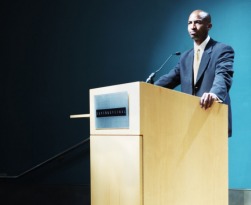 |
| Source: Funeral SOS |
In my capacity as a funeral director, professional colleagues call on my assistance from time to time. During one of these times I had the privilege of serving a family that brought a new dynamic to the service. The family brought two poster boards full of pictures that all attending were able to see prior to the service. Just before the service began, the daughter of the deceased beckoned me to her. She handed me a picture and asked that I start passing it once the eulogy began. I referenced the picture in my opening announcements and started the "picture passing" as the eulogy began. When the service concluded I asked for the picture to be returned, and the picture was returned. The family was able to share the memory without losing the picture.
The beauty of this idea lies in it's simplicity. Memories are evoked by pictures, stories and hugs prior to the service. As the service begins, the family takes the opportunity to share their favorite memory via a single picture. Funeral attendants that are familiar with the picture are able to recall and share the memory. Those unfamilar with the picture substitute their own favorite memory. The family may even choose to explain the significance of the picture as part of the eulogy, sharing that specific, special memory with all. Death and funerals are unsettling for obvious reasons. It can be difficult for family and close friends to concentrate. The technique of focusing on a specific memory using a photo as the lens is very powerful. Interference from outside the model is minimized and all can partake of the moment. I find this approach so strong I wish I could claim it as my own.
A note to the "more is better" crowd. I would strongly suggest the use of a single photo, no more. The road from 1 picture to 2 pictures, to a portfolio and then an album is easy to find. Quantity (more than one) clutters the field making it harder to maintain focus. As I began the previous paragraph, the beauty is in the simplicity of a single picture.
Why should this idea be limited to funerals? Think of someone you love. Recall a memory, poignant for devotion, honesty, humor, whatever makes that memory definitively unique. File that memory in a specific accessible area of your mind. Those we love deepest evoke the strongest anger, frustration and disappointment from us. When confronted with flash-point anger, numbing frustration or deep dissapointment from a loved one, take a deep breath and recall that defining memory. Don't forfeit the anger, etc. it's an honest emotion. Instead, use that memory and understand that only those we love the most can hurt us so much. Get beyond the intense pain and begin to deal with the hurt. It beats the hell out of avoiding a loved one or avoiding the issue.
 |
| Source: morgueFile |
Take a moment and consider my proposal. After all, why wait until someone is gone to recall memories. If you wait until the funeral, there is one less person to enjoy that memory.

